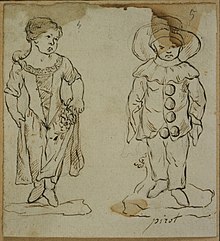The Carnival Is Over
This article needs additional citations for verification. (April 2008) |
| "The Carnival Is Over" | ||||
|---|---|---|---|---|
 Netherlands single picture sleeve | ||||
| Single by the Seekers | ||||
| B-side | "We Shall Not Be Moved" | |||
| Released | 1965 | |||
| Genre | Folk rock, baroque pop | |||
| Length | 3:06 | |||
| Label | Columbia[1] | |||
| Composer(s) | from Russian folk music | |||
| Lyricist(s) | Tom Springfield[1] | |||
| Producer(s) | Tom Springfield[1] | |||
| The Seekers singles chronology | ||||
| ||||
| Official audio | ||||
| "The Carnival Is Over (Stereo) (2009 Remaster)" on YouTube | ||||
"The Carnival Is Over" is a song written by Tom Springfield, for the Australian folk pop group the Seekers. It is based on a Russian folk song from about 1883, adapted with original English-language lyrics. The song became the Seekers' signature recording, and the band customarily closed their concerts with it ever since its success in late 1965.
The single spent three weeks at No. 1 in the UK Singles Chart in November and December 1965.[2] At its 1965 sales peak, the single was selling 93,000 copies per day in the UK with total sales of at least 1.41 million in the UK alone. It stopped The Who from getting to No. 1 with "My Generation".[3]
The song also topped the Australian Charts for six weeks, from 4 December 1965,[4] and reached No. 1 in the Irish Singles Chart for two weeks.
The music
[edit]"The Carnival is Over" was the third hit single written for The Seekers by Tom Springfield, following the success of "I'll Never Find Another You" (1964) and "A World of Our Own" (1965).
Stenka Razin
[edit]The main tune of "The Carnival is Over" is adapted from a Russian song about the Cossack ataman Stenka Razin which became popular in Russia in the 1890s.[5] The original poem of "Stenka Razin" was written in 1883 by the poet and Povolzhye region ethnographer Dmitry Sadovnikov. The text of this poem, with minor changes, was set to the music of a popular Russian folk melody[6] by an unknown author.[7]
It told about an episode of the 1670–1671 Russian Peasant Uprising in which Razin allegedly killed his captive, a beautiful Persian Princess whom he had just married. Razin throws the Princess from his boat into the River Volga, in a gesture addressed to his disgruntled jealous comrades who accuse him of "mellowing down" after just one night spent with a woman.[8]
Score:[9]


The song gave the title to the famous 1938 Soviet musical comedy Volga-Volga. It was performed by the Osipov State Russian Folk Orchestra (balalaikas and domras) during their 1967 tour of Australia. It is played to symbolic effect by the band in a cafe in the 1988 film The Unbearable Lightness of Being after Soviet tanks have crushed the Prague Spring.[10]
The American folk singer Pete Seeger wrote an English language version of "Stenka Razin" called "River of My People" in the 1950s. This song was included in his album Love Songs for Friends and Foes (1956). The lyrics were not a translation of the Russian song, but were newly composed by Seeger himself, while maintaining the motif of the river.[11]

The Seekers version
[edit]Tom Springfield was introduced to the song "Stenka Razin" at the Joint Services School for Linguists during his National Service (1952–54). The school was known as “the Russian course”, and its purpose was to train conscripts in intelligence techniques. Springfield joined the school's Russian choir, and they sang "Stenka Razin" together (in Russian) as part of the course.[12]
Springfield adapted the folk song melody[1] in two significant ways. He altered the time signature from 3/4 to 4/4, and he added a chorus, allowing him to expand the Song structure to AABABA from the simple AAA structure of the original. His decision to base his third song for the Seekers on the haunting Russian melody proved to be "a gold mine".[1] Early in 1965, Springfield travelled to Brazil, where he witnessed the Carnival in Rio. This provided the basis for his new lyrics, including those in the chorus which compare the lovers to the perpetually unhappy Commedia dell'arte characters: "But the joys of love are fleeting / For Pierrot and Columbine."[13] The song depicts "the joys of love" experienced by the pair - when they have to part, the carnival is over.[14]
Boney M. version
[edit]| "The Carnival Is Over" | ||||
|---|---|---|---|---|
 Germany single picture sleeve | ||||
| Single by Boney M. | ||||
| A-side | "Going Back West" (double A-side) | |||
| Released | June 1982 | |||
| Recorded | 1982 | |||
| Genre | ||||
| Length | 4:48 | |||
| Label | Hansa (Germany) | |||
| Composer(s) | Tom Springfield from Russian folk song | |||
| Lyricist(s) | Tom Springfield | |||
| Producer(s) | Frank Farian | |||
| Boney M. singles chronology | ||||
| ||||
| Music video | ||||
| "Boney M. - The Carnival Is Over (Official Video)" on YouTube | ||||
The German band Boney M. released their cover version of the Seekers' song in 1982 under the title "The Carnival Is Over (Goodbye True Lover)". The song featured Liz Mitchell on lead vocal, and included a new original verse by producer Frank Farian and lyricist Catherine Courage to introduce Reggie Tsiboe as a vocalist following the departure of Bobby Farrell from the band.[15] Despite reaching No.11 in the Swiss charts, the single was widely considered Boney M.'s first flop.[16]
Farian attempted to remedy this failure by producing a number of shorter versions, culminating in a release for the Japanese market in which Tsiboe's interpolated verse was omitted. This can be found on the 2001 album Their Most Beautiful Ballads,[17] but it had no more success than previous versions.[18]
Nick Cave version
[edit]Nick Cave & the Bad Seeds covered the Seekers' version of "The Carnival is Over" on their 1986 album "Kicking Against The Pricks". This was the third album released by the Australian rock band. Remarking on the song selection on the Album, Cave said:
Some songs had just kind of haunted my childhood, like "The Carnival is Over", which I always loved.[19]
Dean & Britta version
[edit]Dean & Britta duo of Dean Wareham and Britta Phillips covered the Seekers' version of "The Carnival is Over" on their 2020 album "Quarantine Tapes" during the pandemic. Dean Wareham said:
Yeah, those recordings sound intimate, obviously they are more stripped down, sometimes just voices, acoustic guitar and bass guitar so the vocals are more front and centre — I really love “He Dines out on Death” by Cristina Monet Zilkha and “The Carnival is Over” by The Seekers — two songs we tried to record ten years ago but never finished, and then the titles jumped out at me as being especially relevant.[20]
References
[edit]- ^ a b c d e Rice, Jo (1982). The Guinness Book of 500 Number One Hits (1st ed.). Enfield, Middlesex: Guinness Superlatives Ltd. p. 97. ISBN 0-85112-250-7.
- ^ Roberts, David (2006). British Hit Singles & Albums (19th ed.). London: Guinness World Records Limited. p. 185. ISBN 1-904994-10-5.
- ^ Ami Sedghi (4 November 2012). "UK's million-selling singles: the full list". The Guardian. Retrieved 4 November 2012.
- ^ "Australia's No.1 Hits of the 1960's". Retrieved 21 September 2015.
- ^ "Russian Folk Songs. Notes and Lyrics". Russianplanet.ru. Retrieved 6 April 2014.
- ^ Rozanov, Ivan. From Book to Folklore. How poems become folk songs. Literaturny Kritik. No.4, 1935 // От книги в фольклор. Какие стихи становятся популярной песней. // "Литературный критик 4 (1935). pp. 2–3.
- ^ alternative titles in Russian: "Iz-za ostrova na strezhen" (Из-за острова на стрежень, "From Behind the Island to the Midstream") or "Volga, Volga mat' rodnaya" (Волга, Волга, мать родная, "Volga, Volga, Dear Mother")
- ^ Позади их слышен ропот / "Нас на бабу променял, / Только ночь с ней провожался, / Сам на утро бабой стал".
- ^ "Д. Садовников - Из-за острова на стрежень (с нотами)". a-pesni.golosa.info. Archived from the original on 19 July 2008. Retrieved 12 January 2022.
- ^ at 42min
- ^ "Songfacts 206. The Seekers". Retrieved 26 April 2022.
- ^ "Tom Springfield's Cossack connection FT 14 June 2013". Retrieved 1 May 2022.
- ^ Cashman, Richard I. (30 August 2006). The Bitter-sweet Awakening: The Legacy of the Sydney 2000 Olympic Games. Walla Walla Press. ISBN 9781876718909 – via Google Books.
- ^ "Every UK Number 1 - Tom Springfield". Retrieved 30 April 2022.
- ^ "Boney M singer reveals real reason '70s band split up". Retrieved 5 May 2022.
- ^ "The Carnival Is Over, Song von Boney M. Chart-Informationen". Retrieved 21 August 2022.
- ^ Track 1, 3:43min, full length version is 4:48min
- ^ "Boney M, Their Most Beautiful Ballads". Discogs. Retrieved 6 May 2022.
- ^ Tracee Hutchison (1992). Your Name's On The Door. Sydney: ABC Enterprises. p. 115. ISBN 0-7333-0115-0.
- ^ "ASK A FEW QUESTIONS: DEAN WAREHAM INTERVIEW". concreteislands.com. Retrieved 19 February 2024.
External links
[edit]- The Carnival Is Over (1965 version) at seekerslyrics.net

